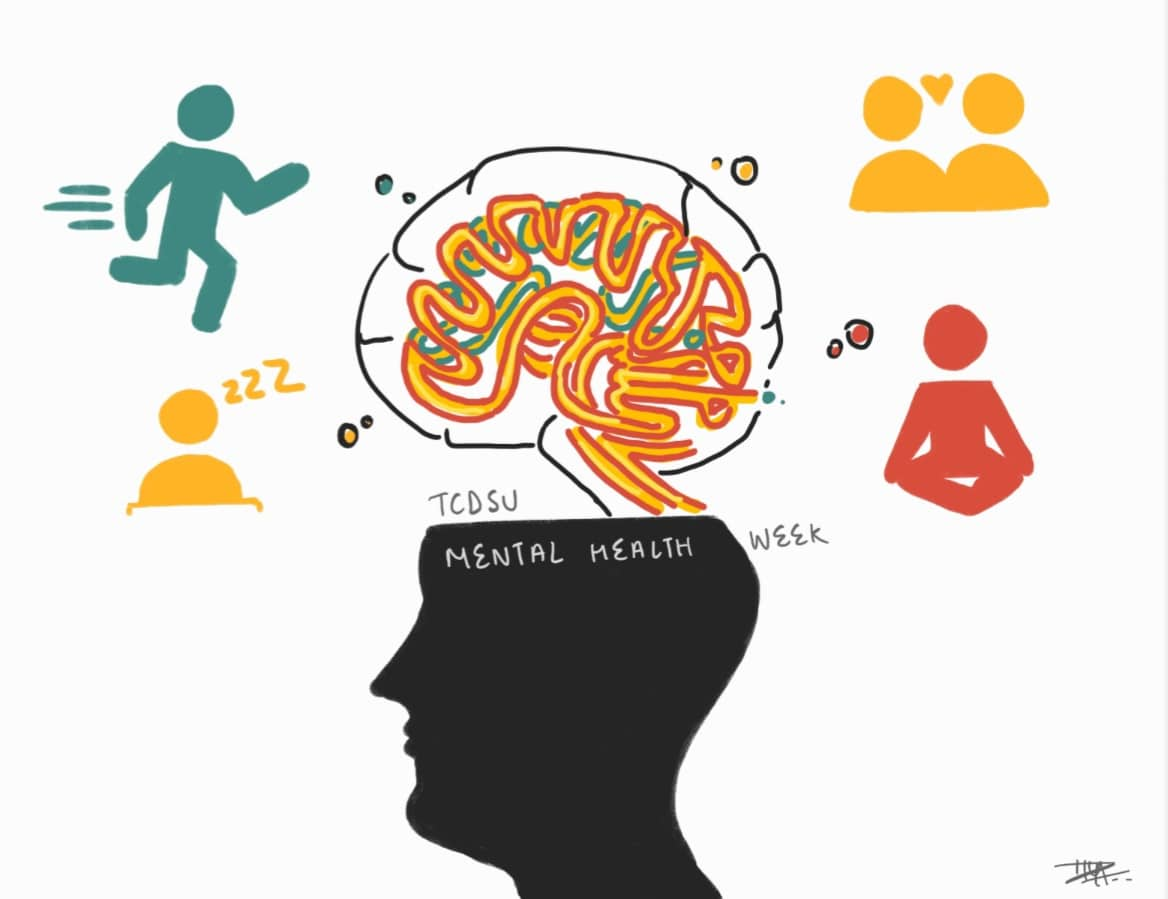University can be a difficult time for anyone. The challenges of self-motivated learning, the often-jarring experience of leaving home, and the anxiety of navigating new social relationships take their toll. Increasing responsibilities and the impetus to perform well academically can put a strain on mental health. Finding the “right” group of friends and the expectation to maintain an Instagram-worthy social life are common pressures. Not to mention the stress of a part-time job, accommodation, tuition, and internships. According to the findings of a 2019 report from the Union of Students in Ireland (USI), 38.4% of students experience severe levels of anxiety and 29.9% suffer from depression. On the other hand, the conversation around mental wellbeing has been growing this past decade, as more and more efforts are being made to educate people about the importance of psychological health and reduce the stigma around mental illness.
“When it comes to taking care of one’s mental wellbeing, the USI report found that students who engage in activities outside of coursework felt more positive about their mental health on average.”
Trinity has a number of initiatives and programs in place to support positive mental wellbeing, and provide help to those struggling with mental health issues, from college counselling services to TCDSU Mental Health Week. Yet, the role that Trinity’s societies play in the mental health of students is also an important one. When it comes to taking care of one’s mental wellbeing, the USI report found that students who engage in activities outside of coursework felt more positive about their mental health on average. Finding a distraction from stress in an activity that you enjoy, and maintaining social interaction, has clear benefits. Trinity’s societies can be an outlet for relieving stress, making like-minded friends and expanding your interests.
[/pullquote]“PsychSoc organises events that aim to encourage awareness and communication around psychological wellbeing, and always hold a panel discussion during TCDSU Mental Health Week.”[/pullquote]
DU Psychological Society is one with a particular emphasis on mental wellbeing. Society chairperson, Danielle Caffrey, explains that “psychology places a large emphasis on the understanding, diagnosis and treatment options for mental health issues, so this focus on mental health is something that we aim to reflect in the society.” PsychSoc organises events that aim to encourage awareness and communication around psychological wellbeing, and always hold a panel discussion during TCDSU Mental Health Week. Caffrey strongly believes in the importance of Trinity societies for student wellbeing. “I think societies help us all to strike a work-life balance, which is imperative in normal circumstances, but perhaps even more so during this crazy year!”
Indeed, this year presents unique difficulties for any student. Loneliness, anxiety, a lack of regular social interaction and the challenge of online learning are issues that we are all struggling with to varying degrees. Societies may provide some respite from these feelings. TCDSU Welfare Officer, Leah Keogh, says: “Societies are intrinsic to student mental health now more than ever. Social isolation has a high correlation with poor mental health and societies foster a sense of community, albeit online.” Societies have made an admirable effort to maintain this sense of community and continue to organise regular events, despite the complexity of doing so virtually. Above all, they encourage some sense of normality, and are an uplifting presence in their enthusiasm.
[/pullquote]“The overarching message of the week is “It’s OK not to be OK”.”[/pullquote]
TCDSU Mental Health Week also had to move mostly online this year. Keogh remarks: “Remote campaigns certainly bring with them a number of obstacles. Notwithstanding, this was the first of the year and I really wanted to do a good job. I shifted my focus towards social media and outreach by live-streaming the panel discussions and open conversation.” Societies are normally involved in the various events scheduled during the week, and this year was no different, with a film screening, yoga class, Comedy Soc X Ents collaboration and mental health panel discussion. This Coping with Covid panel was hosted by PsychSoc. Caffrey explains that the discussion included the “importance of psychological well-being during the pandemic; such as learning to balance working from home with relaxing” and “useful ways of coping with the uncertainties of everything going on at the moment”, along with “methods of boosting mental resilience.” Mental Health Week, which also included an ice-cream van on campus, proved a success. Perhaps more now than ever, having a specific week dedicated to mental wellbeing is essential. In Caffrey’s view, it creates a positive environment on campus and “gets us all reaching out and checking in with our friends and families to see how they’re doing, while simultaneously making ourselves do a little soul-searching of our own to check in with our own mental health.” The overarching message of the week is “It’s OK not to be OK”, a mantra which aims to “break down the stigma around mental health issues and ask for support and help when we need it.”
We are currently facing another term characterised by uncertainty and government restrictions. Although there is now light at the end of the tunnel, this will be an undeniably difficult last hurdle. Being conscious of mental wellbeing, along with feeling able to ask for help if needed, is important for students. Taking time out of coursework, or even finding a distraction from feelings of anxiety about the future, is not to be underestimated: societies are a perfect vehicle for this. Although many may be understandably wary of Zoom interactions, making the effort to engage is definitely worth it.






